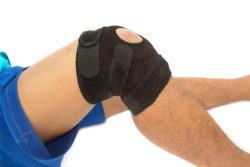 Several revision knee replacement surgery lawsuits allege that defective surgical bone cement used in knee implant surgery can lead to persistent pain, aseptic tibial loosening, and the need for further revision knee surgeries to repair damage caused by the original procedure.
Several revision knee replacement surgery lawsuits allege that defective surgical bone cement used in knee implant surgery can lead to persistent pain, aseptic tibial loosening, and the need for further revision knee surgeries to repair damage caused by the original procedure.
What is Surgical Bone Cement?
Surgical bone cement is a type of medical epoxy used to attach prosthetic devices to a patient’s natural anatomy. It is created by combining a polymer poly powder and a methyl methacrylate liquid and mixing them into a paste that can be applied during surgery. In knee surgery, bone cement is used to connect the prosthetic knee joint to the patient’s tibia (shin bone) and femur (thigh bone).
There are many kinds of surgical bone cement on the market. Several types have been named in litigation alleging serious side effects, including Cobalt HV Bone Cement produced by Biomet/DJO Surgical, DePuy CMW 1 Bone Cement and SmartSet HV Bone Cement produced by DePuy, and Simplex HV Bone Cement produced by Stryker/Howmedica.
One plaintiff, in her lawsuit against DePuy, claims that tibial loosening after her knee replacement surgery caused her pain and suffering, as well as medical expenses including ongoing expenses for rehabilitation and home health care. She further claims that had she been aware of the risks associated with DePuy’s bone cement, she would not have consented to its use during her surgery.
Alleged Dangers of Surgical Bone Cement
One serious side effect of total knee replacement surgeries using surgical bone cement is aseptic tibial loosening. Tibial loosening occurs when the prosthesis becomes loosened from the tibia. Aseptic means that this loosening happens without any accompanying infection.
Aseptic tibial loosening can result in severe bone loss and extreme pain. Often, this will require the patient to undergo additional surgeries to repair the damaged parts of their knee. These reparative surgeries, called revision surgeries, have a lower success rate and higher complication rate than initial total knee replacements.
Information About Total Knee Replacements
The largest joint in the human body is the knee. It is comprised of three bones, the tibia (shin bone), the femur (thigh bone), and the patella (knee cap). These bones are covered with cartilage to enable the joint to function smoothly and allow the bones to slide against each other without grinding.
However, due to longer life spans, more and more people are suffering knee problems as they get older. A common procedure performed to alleviate knee pain and disability is a total knee replacement. This surgery replaces the damaged tissue, bone, or cartilage in a patient’s knee with a prosthesis.
A total knee replacement is meant to give patients back their range of motion, increase the joint’s ability to function smoothly, and decrease pain and discomfort. However, many knee replacement patients have filed lawsuits claiming that the bone cement used in their knee replacement surgery worsened their condition and caused them to develop further health problems and pain.
If you have suffered from tibial loosening or have had or been recommended for revision surgery after a total knee replacement, you may be eligible to file a bone cement lawsuit.
If you or a loved one underwent revision knee replacement surgery or your doctor is recommending revision surgery three years or less after the initial implant and a bone cement was used, you may qualify to file a knee replacement revision surgery lawsuit. See if you qualify by filling out the free form on this page.
ATTORNEY ADVERTISING
Top Class Actions is a Proud Member of the American Bar Association
LEGAL INFORMATION IS NOT LEGAL ADVICE
Top Class Actions Legal Statement
©2008 – 2026 Top Class Actions® LLC
Various Trademarks held by their respective owners
This website is not intended for viewing or usage by European Union citizens.
Get Help – It’s Free
Join a Free Knee Replacement Cement Failure Lawsuit Investigation
If you qualify, an attorney will contact you to discuss the details of your potential case at no charge to you.
PLEASE NOTE: If you want to participate in this investigation, it is imperative that you reply to the law firm if they call or email you. Failing to do so may result in you not getting signed up as a client or getting you dropped as a client.
Oops! We could not locate your form.













3 thoughts onSurgical Bone Cement Side Effects Allegedly Lead to Revision Knee Surgery